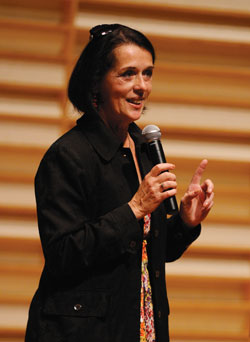|
This year’s third annual Earth “Week” – which grew to 11 days in 2010 – took community engagement and educational outreach to a new level and generated unprecedented results.
The April series of events was organized to educate the campus and community about issues affecting the environment, and teach lifestyle choices that can improve sustainability as well as reduce the region’s carbon footprint.
In the end, over 2,500 people actively participated in 42 events over the 11-day span.
The most significant event was a community-wide, plastic bag-free initiative dubbed, “Shake the Habit,” which drew 60 participating area retailers whose average daily volume of 13,000 customers were exposed to the concept, with many either receiving or investing in reusable bags for the first time.
Developed by chemistry professor and Earth Week Coordinator Sherri Mason, the event took place on Earth Day, April 22, and was designed to change customer preferences and make businesses think twice about how their actions impact the environment.
“I really wanted to find ways that we could make a broader impact in the Dunkirk-Fredonia community this year,” said Dr. Mason, a key participant in both the campus’ Sustainability Committee and the FACE (Fredonia Academic Community Engagement) Center, both of which sponsor Earth Week events. “This year, we wanted Earth Week to extend far beyond the campus borders.”
Earth Day was capped off with a keynote address from legendary Love Canal grassroots activist Lois Gibbs, who also served as this year’s Convocation series keynote speaker.
An event which has become an annual favorite with the community is the Electronics Recycling Day, held for the first time at the Chautauqua County Fairgrounds. More than 500 vehicles lined up to recycle, and by mid-afternoon, more than 130,000 pounds of material – 65 tons which filled five tractor trailers – were otherwise saved from area landfills.
The campus also partnered with the Rotary Club’s annual Home and Garden Show to organize the first ever Chautauqua County Green Expo. English Professor and Sustainability Committee member Christina Jarvis led students in a compact fluorescent light (CFL) bulb giveaway. They distributed 1,350 bulbs, which Dr. Jarvis said equates to a total energy savings of more than $87,000 over traditional incandescent lights. CFL bulbs not only save money, but they lower the amount of carbon dioxide (CO2) emissions. Using incandescent light bulbs for 8,000 hours generates 525 tons of CO2, which plummets to 118 tons when using CFL bulbs, a reduction of nearly 78 percent.
Other highlights included:
- A Lake Erie beach clean-up at Point Gratiot, which drew over 50 volunteers to clean up a 3/8-mile stretch of the beach. In all, 223 bags were filled with 321 pounds of debris;
- “Weigh the Waste” revealed how much food waste can be reduced by not using trays in dining halls. Customers of Erie Dining Center were given the identical menu choices they had one month earlier, and the unconsumed food totals were compared. About five ounces per person was produced in March, but during the April “Trayless Tuesday,” when diners were encouraged not to use trays, waste dropped to 2.7 ounces per person – a 45 percent decline;
- A “Dumpster Dive.” Trash from a residence hall dumpster was sorted to determine what could have been recycled. Over 490 pounds of trash was sorted, and more than 160 pounds (33 percent) was recyclable. These results are encouraging for the campus, which conducted this event for the third straight year. Two years ago, a shocking 90 percent of the waste was recyclable. This illustrates a major change in campus habits and improvements in the awareness of the issues; and
- Fredonia ranked 106 out of 246 colleges in the spring RecycleMania competition, generating impressive year-over-year improvement. Just 7,200 pounds were recycled per week in 2009, a figure that vaulted to more than 10,000 pounds per week in 2010.




